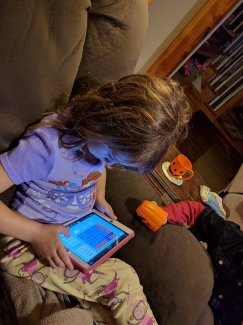Science, Technology, Engineering, and Mathematics (STEM) education just got a big boost from a new iPad App developed by the PhET Interactive Simulations project at the University of Colorado. The 99¢ App is an extension of the award-winning collection of computer simulations of topics in science and mathematics produced by the project.
The project was founded in 2002 by former JILAn and Nobel Laureate Carl Wieman, who obtained funding for it from his own Nobel Prize, the NSF Driectors award. and the Kavli foundation. The project has also received support from JILA’s Physics Frontier Center. Wieman still serves as the PhET project's senior advisor.
"I was inspired to create PhET because of developing interactive simulations to explain my research on laser cooling and evaporative cooling to make a Bose Einstein Condensate," Wieman said. "I noticed in talks that when I using using the sims, everyone in the audience would be paying attention, and questions afterwards reflected something about what the simulations were showing. What was particularly striking to me was that this was equally true with an audience of physics professors as with an audience of seventh graders." Wieman added than many audience members, including kids and their parents, would go home and play with the sims and email him.
Since its inception the PhET project has produced 134 simulations of topics in physics, chemistry, biology, earth science, and mathematics––all available to students with a computer for free online. More than 40 of these simulations have now been redone for use with the iPad App.
“The App serves several purposes,” explained Ariel Paul, who is the project’s Director of Development and runs day-to-day operations. “One is sustainability. As more people purchase the App, the money we earn helps fund reprogramming more simulations for the iPad. And, this means more simulations get included with the App.”
A second advantage of the iPad App is off-line use. With the iPad App, it is a seamless process for students, teachers, and parents to work together to learn STEM topics. A third advantage is that having an iPad App means more people browsing the App Store have the chance to discover just how much fun it is to learn science.
The new iPad App was designed and coded by five University of Colorado undergraduate students as part of the computer science Capstone Senior Project. The project’s goal was to integrate computer-science majors into commercial projects, providing them with real-world experience.
Recent CU graduates Andrew Arnopoulos, Ellie Daw, Luis Olivas, Eric Rudat, and Sheefali Tewari spent two semesters applying their design and coding skills to enhance the long-range impact of the PhET project. Thanks to their efforts and some tweaking by a third-party contractor, the new iPad App is opening new and exciting opportunities for the use of PhET by students, teachers, and parents.
“We wanted to connect more directly with parents seeking educational tools, and provide kids with an easy way to access PhET simulations at home, on a road trip, or anywhere,” said PhET Director Kathy Perkins, associate professor of physics and the mother of 8-year-old twins. Perkins said that because the App is educational and only costs 99 cents, she wouldn't think twice about buying it.
“Even students as young as 4–5 years old get something out of playing with the App because they can start to begin to explore on their own,” added Paul. “We’re finding that even with Sims designed for older children, there are a lot students who can get a lot out of them at a younger age. Plus parents today want to make sure if their children are on an iPad and using an App that it has educational value.”
The new PhET App is now available at Apple’s App Store.



 The Physics Frontiers Centers (PFC) program supports university-based centers and institutes where the collective efforts of a larger group of individuals can enable transformational advances in the most promising research areas. The program is designed to foster major breakthroughs at the intellectual frontiers of physics by providing needed resources such as combinations of talents, skills, disciplines, and/or specialized infrastructure, not usually available to individual investigators or small groups, in an environment in which the collective efforts of the larger group can be shown to be seminal to promoting significant progress in the science and the education of students. PFCs also include creative, substantive activities aimed at enhancing education, broadening participation of traditionally underrepresented groups, and outreach to the scientific community and general public.
The Physics Frontiers Centers (PFC) program supports university-based centers and institutes where the collective efforts of a larger group of individuals can enable transformational advances in the most promising research areas. The program is designed to foster major breakthroughs at the intellectual frontiers of physics by providing needed resources such as combinations of talents, skills, disciplines, and/or specialized infrastructure, not usually available to individual investigators or small groups, in an environment in which the collective efforts of the larger group can be shown to be seminal to promoting significant progress in the science and the education of students. PFCs also include creative, substantive activities aimed at enhancing education, broadening participation of traditionally underrepresented groups, and outreach to the scientific community and general public.